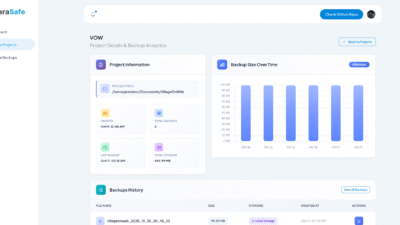How the idea started
This project began like a chat between peers: as a Laravel developer, running regular backups on live VPS boxes kept turning into late‑night rituals with manual dumps and zip routines chewing up time that should have gone into building features and fixing bugs. Hosting‑side automation wasn’t a silver bullet either because providers charge a noticeable percentage for backup add‑ons, which adds up fast when bootstrapping small client apps or SaaS experiments. There are plenty of tools out there, but the goal here was a Laravel‑first workflow that speaks the framework’s language and stays focused on what Laravel teams need right now, not someday. LaraSafe is built around that idea: keep it Laravel‑centric, make scheduling and restores obvious, support popular storage targets, and eliminate unnecessary friction from the daily ops routine.
Why Another Backup Tool?
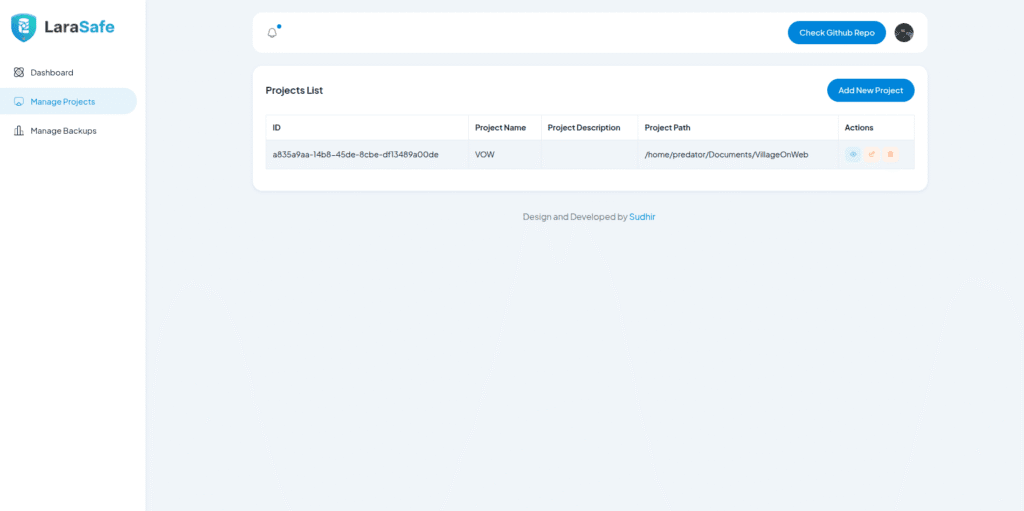
The Laravel ecosystem has several backup solutions, but most fall short when it comes to user experience and modern development practices. While packages like Spatie’s laravel-backup are powerful, they lack intuitive interfaces for non-technical users. That’s where LaraSafe bridges the gap.
The Problem with Existing Solutions
Traditional backup approaches often require command-line expertise or complex configurations. Developers end up writing custom scripts or relying on cron jobs that fail silently. Business owners want simple dashboard controls, not terminal commands.
What Makes LaraSafe Different
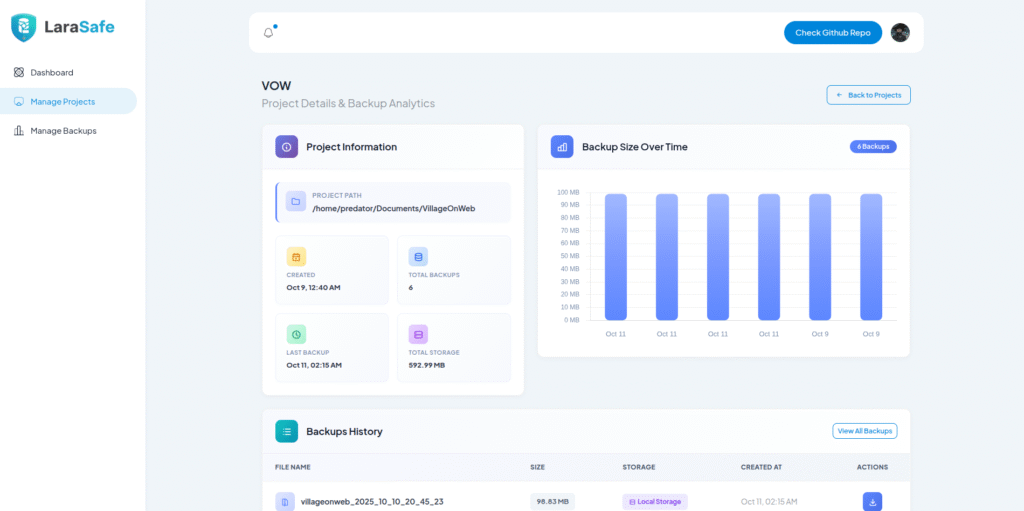
Modern Tech Stack
LaraSafe leverages the latest Laravel 11+ features combined with Vue.js and Inertia.js for a seamless single-page application experience. This isn’t just another PHP script – it’s a full-featured backup management platform.
Key Features
Database Backup Management: LaraSafe handles MySQL, PostgreSQL, and SQLite databases with intelligent compression and encryption options. The system automatically detects your database configuration and optimizes backup procedures accordingly.
File System Integration: Beyond databases, the platform manages complete file backups including application files, user uploads, and configuration data. Smart exclusion rules prevent unnecessary files like vendor directories and cache from bloating your backups.
Intuitive Dashboard: The Vue.js frontend provides real-time backup status, scheduling controls, and restoration capabilities without touching the command line. Non-technical team members can manage backups confidently.
Multiple Storage Options: Support for local storage, cloud providers, and custom endpoints ensures your backups reach safe destinations. Integration with popular services like Dropbox, AWS S3, and Google Drive comes out of the box.
Technical Architecture
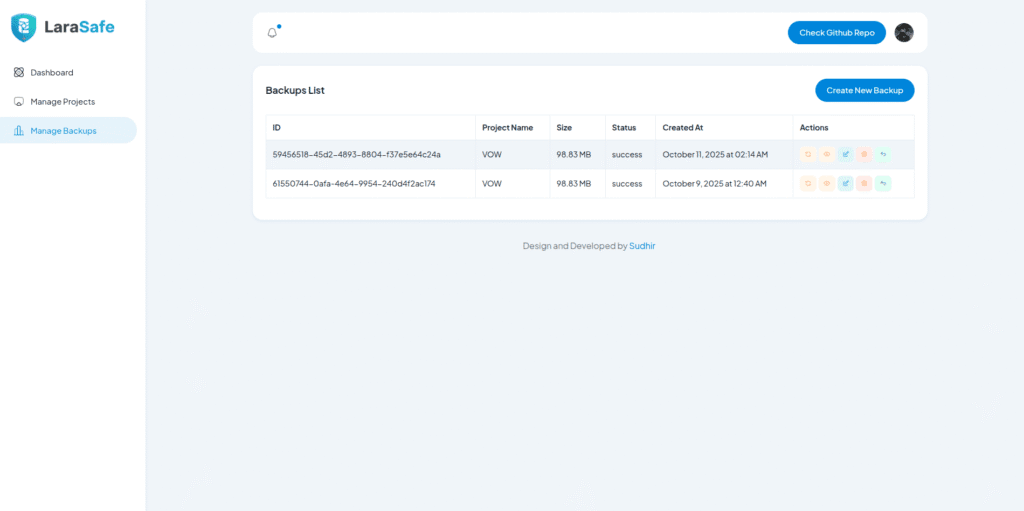
Laravel 12 Foundation
The backend leverages Laravel’s latest features including improved routing, enhanced job queuing, and optimized database operations. Custom Artisan commands handle backup execution while maintaining full compatibility with Laravel’s ecosystem.
Vue.js Frontend with Inertia
The user interface utilizes Vue 3’s composition API for reactive components and efficient state management. Inertia.js eliminates the complexity of separate frontend/backend APIs while maintaining the benefits of modern JavaScript frameworks.
Database Design
LaraSafe employs a clean database schema to track backup jobs, schedules, and metadata. The system maintains detailed logs of backup operations, file sizes, and completion status for comprehensive monitoring.
Getting Started
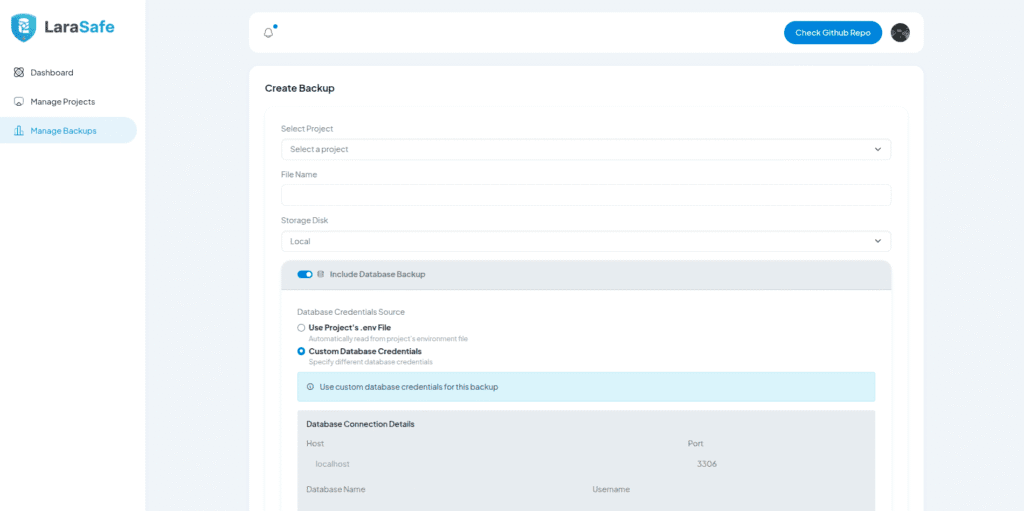
Installation Requirements
- GitHub: https://github.com/sudhirrajai/LaraSafe
- PHP 8.2 or higher
- Laravel 11+
- MySQL/PostgreSQL database
- Node.js for asset compilation
- Required system binaries (mysqldump, tar, gzip)
Basic Setup
The installation process follows Laravel conventions with simple Artisan commands for database migration and configuration publishing. Default settings work for most applications, but extensive customization options accommodate complex requirements.
Configuration Options
LaraSafe provides granular control over backup procedures through environment variables and configuration files. Users can specify inclusion/exclusion patterns, compression levels, encryption settings, and storage destinations without modifying code.
Advanced Features
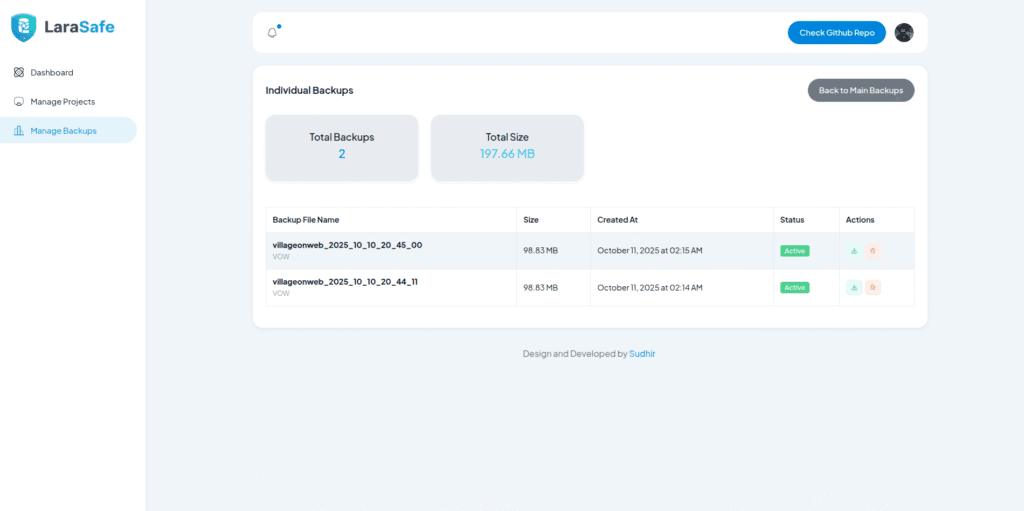
Automated Scheduling
Built-in cron integration allows flexible backup scheduling from simple daily backups to complex multi-tier retention policies. The system automatically purges old backups based on configurable rules to manage storage costs.
Health Monitoring
LaraSafe includes comprehensive health checks to verify backup integrity and system status. Automated notifications alert administrators to failures or configuration issues before they become critical problems.
Restoration Capabilities
When disasters strike, LaraSafe’s restoration features minimize downtime. The platform can restore complete applications or individual components through the same intuitive interface used for backup management.
Security Considerations
Data Encryption
All backup data supports AES-256 encryption both in transit and at rest. Custom encryption keys ensure that even cloud-stored backups remain secure from unauthorized access.
Access Control
Role-based permissions integrate with Laravel’s authentication system to control backup access. Administrative functions require proper authorization while maintaining audit trails for compliance requirements.
Performance Optimization
Efficient Processing
LaraSafe utilizes Laravel’s queue system for background processing, preventing backup operations from impacting application performance. Large backups process incrementally to minimize server resource consumption.
Storage Management
Intelligent compression algorithms reduce backup sizes while maintaining data integrity. Incremental backup options capture only changed files, dramatically reducing storage requirements for frequent backups.
Real-World Benefits
Development Teams
Developers gain confidence in deployment processes knowing reliable backups exist. Local development environment restoration becomes trivial, improving productivity during testing and debugging.
Business Operations
Non-technical stakeholders can verify backup status and initiate emergency procedures without developer intervention. Compliance requirements become manageable through automated documentation and retention policies.
Cost Efficiency
Reduced storage costs through compression and intelligent retention policies. Automated processes eliminate manual backup procedures, reducing operational overhead.
Future Roadmap
Enhanced Integrations
Planned integrations with popular monitoring services and communication platforms will provide even better visibility into backup operations. API endpoints will enable custom integrations with existing business systems.
Performance Improvements
Ongoing optimization efforts focus on reducing backup times and storage requirements while maintaining data integrity. Advanced algorithms will enable faster restoration procedures for critical situations.
Conclusion
LaraSafe represents a significant step forward in Laravel backup management. By combining modern development practices with intuitive user interfaces, it addresses real-world needs that existing solutions often overlook.
Full Repo Link – https://github.com/sudhirrajai



